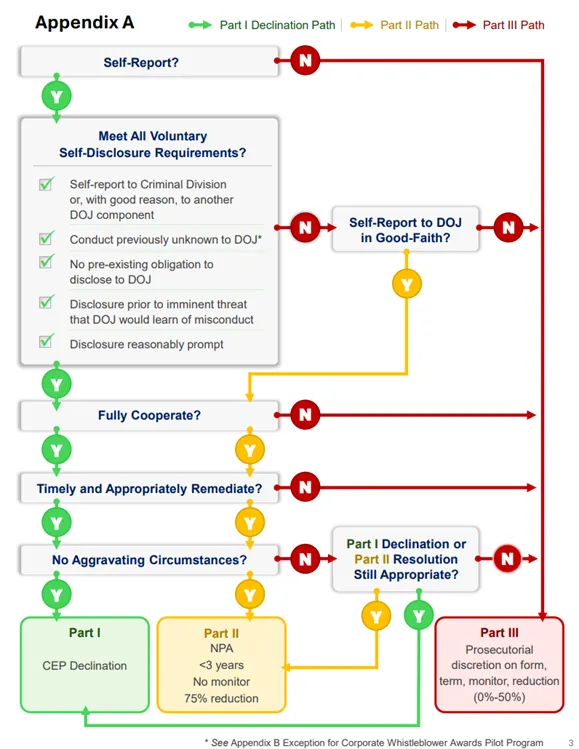DOJ Announces Revisions to Corporate Enforcement and Voluntary Disclosure Policy
The US Department of Justice (DOJ) revised its Criminal Division Corporate Enforcement and Voluntary Disclosure Policy (CEP), outlining the benefits a company may earn by voluntarily self-disclosing misconduct, as well as the path to resolution in other cases. The DOJ aimed to simplify the document and clarify the outcomes that companies can expect.
The updated policy also includes a flowchart (reproduced below) to illustrate the different outcomes that might result from various scenarios such as declination, non-prosecution agreements, and other resolutions. Notably, in the absence of “aggravating circumstances,” the DOJ’s Criminal Division states that it will decline to prosecute if a company self-discloses misconduct, fully cooperates, and timely and appropriately remediates misconduct. Moreover, even if a non-prosecution agreement, rather than a declination, is warranted, the Criminal Division may not require an independent compliance monitor. (A separate Memorandum on Selection of Monitors in Criminal Division Matters was also issued this week by the Head of the Criminal Division).
Declinations
Significantly, the revised CEP offers more transparency for resolutions in the case of corporate self-disclosure. The previous iteration offered a “presumption of a declination” for self-reporting companies that satisfy established criteria. Now, however, the Criminal Division states that it “will decline” to prosecute a company for criminal conduct when the following additional factors are met (in accordance with requirements set forth in an appendix):
- The company voluntarily self-disclosed the misconduct to the Criminal Division.
- The company fully cooperated with the Criminal Division’s investigation.
- The company timely and appropriately remediated the misconduct.
- There are no aggravating circumstances related to the nature and seriousness of the offense, egregiousness or pervasiveness of the misconduct within the company, severity of harm caused by the misconduct, or criminal adjudication or resolution within the last five years based on similar misconduct by the entity engaged in the current misconduct.
In contrast to the previous policy, even if aggravating factors are present for a company that self-discloses, prosecutors will have full discretion to weigh the severity of the factors and may still recommend a CEP declination. Companies will still have to pay disgorgement and forfeiture fees along with restitution or compensation to the victims of the misconduct.
Non-Prosecution Agreements
If a company voluntarily disclosed misconduct to the Criminal Division and acted in good faith to fully cooperate and timely remediate but is ineligible for declination because (1) self-reporting did not qualify as voluntary self-disclosure[1] (e.g., unbeknownst to the company, the government was already aware of the misconduct) or (2) aggravating factors may warrant a criminal resolution, the Criminal Division may offer a company a Non-Prosecution Agreement (NPA). In this scenario, the Criminal Division “shall”:
- Provide an NPA — absent particularly egregious or multiple aggravating circumstances.
- Allow a term length of fewer than three years.
- Not require an independent compliance monitor.
- Provide a reduction of 75% off the low end of the US Sentencing Guidelines (USSG) fine range.
Besides the absence of criminal charges, NPAs are more lenient than Deferred Prosecution Agreements as they do not usually require a monitor or court approval (indeed, they are not even filed in court).
Other Resolutions
Under the new CEP, if a company is ineligible for a declination or an NPA but has met some of the factors listed in Declinations above, prosecutors may consider form, term length, compliance obligations, and monetary penalty to determine the appropriate resolution. In such cases, the Criminal Division “will not … recommend a reduction of more than 50% off the fine” under the USSG and there will be a presumption that the reduction will be taken from the low end of the sentencing range. While the concept regarding a reduction in monetary penalty is unchanged from the prior CEP, there was a noticeable tone shift, from a carrot to a stick; previously, the CEP stated that the Criminal Division would recommend “up to a 50% reduction off of the low end of the USSG fine range.”
Timely and Appropriate Remediation Are Key Steps on the Path to Declination or NPA
As noted above, full cooperation and timely and appropriate remediation are necessary for self-disclosing companies to receive either a declination or an NPA. Companies need to continue to focus on implementing effective corporate compliance programs and appropriately retaining accurate business records so that if misconduct is identified, detailed root cause analyses can be undertaken. Other remediation efforts include disciplining employees involved in misconduct and retraining as necessary.
Flowchart

[1] “Voluntary Self-Disclosure” is defined in Appendix B of 9-47.120 - Criminal Division Corporate Enforcement and Voluntary Self-Disclosure Policy.



